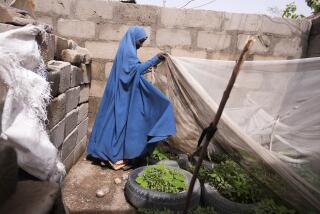Health Services Sought for Nigeria’s Teen-Age Mothers : Africa: Childbirth injuries leave many as outcasts. Risks are great for all pregnant women in rural areas.
- Share via
ABUJA, Nigeria — Larai married at 11 and almost died in childbirth at the age of 13 when she collapsed with a ruptured womb after two days in labor.
She lost her baby and joined thousands of young Nigerian women made outcasts in their teens each year--crippled and incontinent because of poverty, tradition and a lack of basic medical care.
“When we began our work in 1985, we found 300 girls like Larai roaming the hospital waiting for an operation performed only 10 times a year,” said Amina Sambo, coordinator of the Vesico Vaginal Fistula (VVF) program for the National Council of Women’s Societies.
She is based in Kano in predominantly Muslim northern Nigeria, where the frequency of pregnancy among girls not physically ready for it increases the incidence of VVF--tearing of the uterus into the bladder or bowels because of obstructed labor.
Victims either die or go through life with urine, feces or both leaking uncontrollably into the vagina.
They are frequently sent packing by their polygamous husbands. Many turn to prostitution.
Sambo led a fund-raising campaign to build an operating theater in Kano that now patches up 24 VVF sufferers a month.
“We must call on our men . . . to refuse to put immature girls in the family way. It may be the first and last time they will ever become pregnant,” Health Minister Olikoye Ransome-Kuti told a conference on safe motherhood in September.
An internationally recognized advocate of cost-effective, basic health services, he has pressured the military-led federal government to promote birth control and improve care for mothers and children.
Progress is painfully slow, for cultural as well as financial reasons, Sambo said.
“We concentrate on raising awareness--explaining the dangers of child pregnancy, that pregnant women of whatever age need medical care and that girls should stay at school until they are old enough to marry,” she said.
Motherhood carries 400 times as much risk in Nigeria as in Europe or North America, said experts at the conference in Abuja, the country’s planned future capital.
Nigeria accounts for a tenth--75,000 a year--of all world deaths from motherhood.
Every few minutes a Nigerian woman dies in pregnancy or childbirth from bleeding, infection, obstruction, rupture, hypertension or abortion complications.
Most would not die if they had the knowledge, the social status and the financial means to avoid getting pregnant too young, too old and too often, and to benefit from the advice and care of trained medical staffs.
But few do, certainly not the 70% or more who live in rural areas far from the towns where this vast country’s few doctors, nurses and midwives cluster.
Clara Ejimbi, a community physician in northern Kaduna state, said she covers 35,000 people without the help of a single gynecologist. There is not even an ambulance.
“Ninety-nine percent of deliveries are handled at home by TBAs--traditional birth attendants,” she said.
These are usually older women in the community, illiterate and without any formal medical training, but well able to help a healthy mother with a normal delivery.
It is when complications arise--as they often do with undernourished and overworked mothers living without such basic amenities as sanitation and safe water--that things can go badly wrong.
Irene Thomas, one of Nigeria’s first woman doctors and a veteran campaigner for safe motherhood, is working to educate TBAs against traditional practices that endanger women from different ethnic and religious groups all over Africa.
Ritual genital mutilation--so-called female circumcision--leaves scars that obstruct childbirth. Taboos on certain foods may deprive pregnant women of a healthy diet.
Women continue working during pregnancy, and signs of danger are accepted as normal, or as omens of another kind--swollen feet as a sign of twins, for example.
If labor drags on--five days is not uncommon--the family is more likely to consult an oracle than a doctor.
Or the local barber may be called to make cuts, slashing at the vagina or cervix with an unsterilized blade, often damaging the child as well as the mother.
“No scientific reasons are provided to substantiate these practices, the pain, trauma . . . disability and even death of the victims notwithstanding,” Thomas said.
Women have little say in determining their own fate, having to defer to fathers, husbands and traditional chiefs.
Even if people accept that they need trained medical help, the cost of transport, drugs and the treatment itself may be more than the family can bear.
Kelsey Harrison, a pioneering gynecologist whose work in the northern city of Zaria first raised the alarm in 1985, says motherhood is becoming more hazardous as debt-burdened Nigeria and 100 million people sink deeper into poverty.
“Resort to traditional forms of care . . . with all its attendant risks is gaining ground,” he said.
“People said that things would have to change after our Zaria study, and they have--for the worse.”
More to Read
Sign up for Essential California
The most important California stories and recommendations in your inbox every morning.
You may occasionally receive promotional content from the Los Angeles Times.













